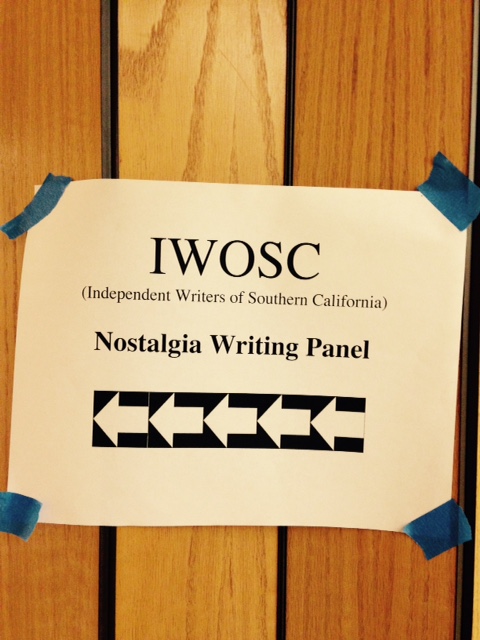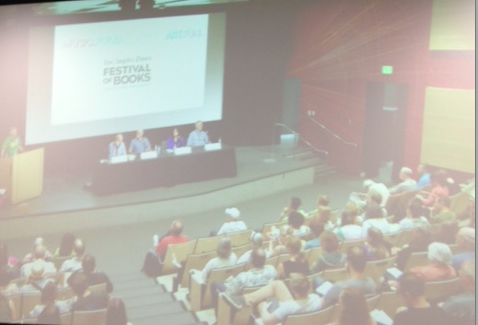 Autumn harvest behind house here in Santa Monica
Autumn harvest behind house here in Santa Monica
Conversations By Marx: A desert dessert

[TODAY’S ENTRY INSPIRED BY YESTERDAY’S IWOSC PANEL REMINDING ME OF MARX PANEL]
So this was out in the high desert just after dinner with the son of Harpo and Susan Marx telling us one of his parents’ favorite jokes.
Bill Marx, now in his 70s, pianist by profession, twinkle in his eye by lifestyle, had just hosted “Marx Madness” — an evening at the Rancho Mirage Public Library in honor of the 100th anniversary of the Marx Brothers’ first appearance on stage. We sat at a long table in the back room of what was formerly Bing Crosby’s restaurant. Now its an Old Spaghetti Factory across Highway #111 just inside Palm Desert.
Bill’s sister Minnie Susan Marx, now Minnie Susan Marx Eagle, was here, too. Along with two of her grandchildren visiting from Orange County, as well as a journalist who came from Toronto and a funny woman named Trudy who came all the way from England for the event, where everyone sang old funny songs and Bill showed home movies featuring Groucho with children in Beverly Hills with nothing but farmland around, and Harpo and his children at 701 N. Canon — and other goofy stuff for a few hours. Also around this grand groaning board were Paul G. Wesolowski, editor of the Freedonia Gazette in Free Hope PA, comedy writer David Misch author of Funny: The Book and a panelist with me at “Marx Madness,” as well as seminal biographer of the Brothers (and of Walter Lantz, too!), Joe Adamson. Plus, Gummo Marx’s son Bob Marx, and also across from me, Robert S. Bader, whom I mentioned in yesterday’s blog. Robert is an archivist of mucho Marxian memorabilia and author of the upcoming book about this very stage career we’ve been celebrating tonight: Four of the Three Musketeers: The Marx Brothers on Stage.
Now Harpo’s son Bill stood up at the end of the table, telling us this joke. He said his mother Susan Marx loved to tell the children this one, about three guys in a mental hospital who are offered the chance to get out, if they can answer the question:
“What is 3 times 3?”
“270!” says the first guy.
“No, sorry,” says the hospital administrator who is administering the test.
“Tuesday!” says the second guy.
“Sorry,” the hospital head says again.
Finally, he asks the third guy: “What is 3 times 3?”
“3 times 3 is 9.”
The administrator is amazed. “Okay,” he tells the patient. “You can leave the hospital now. Oh by the way, how did you know that?”
“Simple,” says the patient. “I just took 270 and divided by Tuesday.”
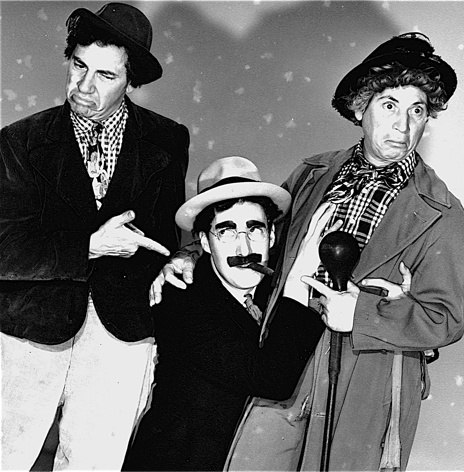
LINKS to authors mentioned above
Bill Marx’s Harpo family site: http://www.harposplace.com/index.php
Robert S. Bader https://www.amazon.com/Four-Three-Musketeers-Brothers-Stage/dp/0810134160
Freedonia Gazette and all things Marx Brothers: http://www.marx-brothers.org/links.htm
The Chico, Harpo, Groucho Society who put on “Marx Madness” event http://cghsociety.blogspot.com
NOSTALGIC FOR CONVERSATION?
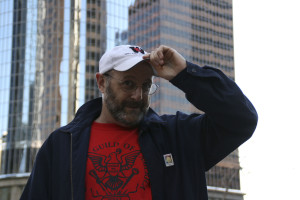
AHOY THERE,
FELLOW
CONVERSATION FANS !
It’s been a few weeks and I was starting to miss talking to you.
Ever find yourself nostalgic for good conversation?
I found myself in a long discussion with four writers on a panel recently. The Topic?
Nostalgia.
Was it Nietzche who said nostalgia was, “looking backwards with bullshit in both eyes”?
Well this panel was certainly full of it.
And full of fun too.
Presented by the Independent Writers of Southern California (IWOSC) at the Veterans Memorial Building in Culver City, CA: “Writing Nostalgia: When the Past Sings, Make it Zing.”
IWOSC host Gary Young quotes Noel Coward to get things going: “May you have a warm hand on your opening,” Coward told a starlet before her show. Warming to the idea of a raucous couple of hours, I lean into the microphone when moderator Bob Birchard asks us how we became nostalgic, and say: “I’m nostalgic for good conversation and can’t wait to hear some tonight!”
I take my cues from the venerable experts here tonight, like Jordan R. Young, showbiz historian and author of books like, Spike Jones Off The Record. He recalls a time, he says, “Before camp, before nostalgia,” way back in the 1950s when he could call up Silent Movie actors names he saw listed in the phone book.
They don’t make researches like that anymore.
Through such determined journalistical sleuthing, Jordan sought out celebrities, holding conversations with Hollywood figures like King Vidor and John Carradine, eventually starting Past Times Publishing. One of his books, I truly loved: The Laugh Crafters: Comedy Writing in Radio and TV’s Golden Age featured an interview with Irving S. Brecher. And I got to help Irv complete his memoir The Wicked Wit of The West in 2009.
I met Robert S. Bader once in Palm Desert at a dinner thrown by Harpo Marx’s son Bill. Tonight he talks about Groucho Marx and Other Short Stories and Tall Tales. It’s been translated into “dozens of languages, including Catalan.” Bader, a producer of PBS specials on Dick Cavett and Bing Crosby, tells us he didn’t know it was being nostalgic when as a kid he got into the Marx Brothers. But upon sharing that interest, discovering that some other people found it “cool too,” he knew he’d “made a group of friends forever.”
Panel moderator Birchard, writer of a book series called Cecil B. Demille’s Hollywood, makes a point of describing we few fellows on the dais as: “Not Historians.” He wants us to explain to the packed house of Southern California writers how we do our research. Herbie J Pilato, author of The Essential Elizabeth Montgomery and Twitch Upon a Star: The Bewitched Life and Career of Elizabeth Montgomery suggests using classic stock photo agencies like Globe and Photofest.
“Hey whatever happened to Black Star,” I interject. “Does anyone remember them?” When I first saw their photo credits in magazines as a kid I thought it was an African-American agency. (It was around the same time I learned that “Black is Beautiful.”) Bader and Pilato think Black Star is long gone or was bought up by a larger stock house.
Pilato, a one-time actor and NBC page, is founder of a nonprofit called the “Classic TV Preservation Society,” dedicated to shows that reflect “positive things,” including old programs like, “Life Goes On,” “Kung Fu,” “That Girl,” and “Gidget.”
“Herbie, you’d make a great host on the TVLand channel,” I offer.
“I’m working on it,” he says.
Robert S. Bader thrills the Culver City faithful with this tale of research: He discovered two hundred Marx Brothers photos in an attic.
“From that early 1900s period of the Brothers performing on the road.”
Bader’s book comes out in October and is called, Four of the Three Musketeers: The Marx Brothers on Stage. Devoted to Minnie’s boys’ pre-Hollywood movie career. I can’t wait to read about their earliest vaudeville shows and see that trove of pix. (NOTE TO SELF: I also need to pick Bader’s brain about getting The Wicked Wit of the West translated into Catalan.)
INQUIRING IWOSCERS WANT TO KNOW 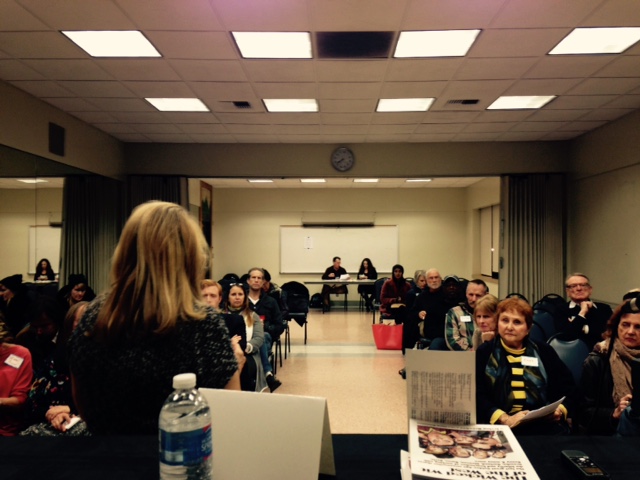
We take questions from the audience. (Flo Selfman, President of IWOSC, at panel above)
One man says he wants to write about a B-movie actress who did pin-ups and died young, but he can’t remember her name.
Next!
One woman says she’d like to write a biography, but read a Marilyn Monroe book that was nothing but erotic stories never documented in any history. Three panelists tell her you can write anything you want about a person no longer living. You see, one says, just because it isn’t true doesn’t mean it can’t also be a lousy read.
Wow. Shouldn’t it matter if a life story is true to the page its printed upon? Neal Cassady offered this advice to Jack Kerouac after reading an early draft: “Embellish.”
Robert Bader says, regarding his Marx Brothers research, Groucho would give two answers to your question, “and then tell you both of them were lies.”
Okay then. I jump in with an “IWOSC mini-seminar,” telling audience members not to worry, but “YOU’VE GOT TO HIT THE TYPEWRITER BROTHER! CREATE YOUR OWN MYTH SISTER!”
In other words, get the dang thing written. To another writer waiting for permission from a subject’s estate: “Write the book already; it’s easier to be forgiven than it is to get permission.”
(Also thinking now of Scoop Nisker, the unique radio man at KSAN in San Francisco who ended every broadcast of “The Last News Show” with, “If you don’t like the news, go out and make some of your own!”)
“Any one of these gentlemen up here will be happy to write you a perfectly good biography or memoir,” I add, although of course I’m thinking of myself on the prowl always for next writing gig.
THE LAST ARCHIVISTS?
A question for Herbie Pilato:
“You can write about Elizabeth Montgomery,” a man asks. “But how can you write about a TV show?” Isn’t that program — product — a corporate property?
“Nah,” Pilato aces it. “There have been ninety books about Star Trek, none of them authorized by Gene Roddenberry.”
“And isn’t everybody an archivist now?” I toss in. “Able to look up anything in a single bound on the web and assume they’ve done the research?”
Jordan Young says he thinks the millennial generation is the last who actually do archive things. “The next generation won’t.”
The first archivists, in Jordan’s field, were the people who audio-taped TV shows. Robert Bader makes a joke about a guy who audiotapes silent movies. I playfully punch him in the side. Later, after I blurt out something, he will say, “You’re scaring me.” (Which you love to get that from an adult. It’s only when you get it from a 4th-grader that you should worry.)
Bader, who said he loved the research part of his job, has been very generous to me this evening, praising The Wicked Wit of the West which he told the audience he read before beginning his new Marx Brothers book. (Yes, fine, but did he believe any of it?)
Realizing my fellow panelists are the kind of people who tape TV shows on reel-to-reel audio, I must confess to being part of that techno-nerd set, taping The Bill Cosby Show, but adding the caveat that this was in 1971 and I was using a cassette recorder.
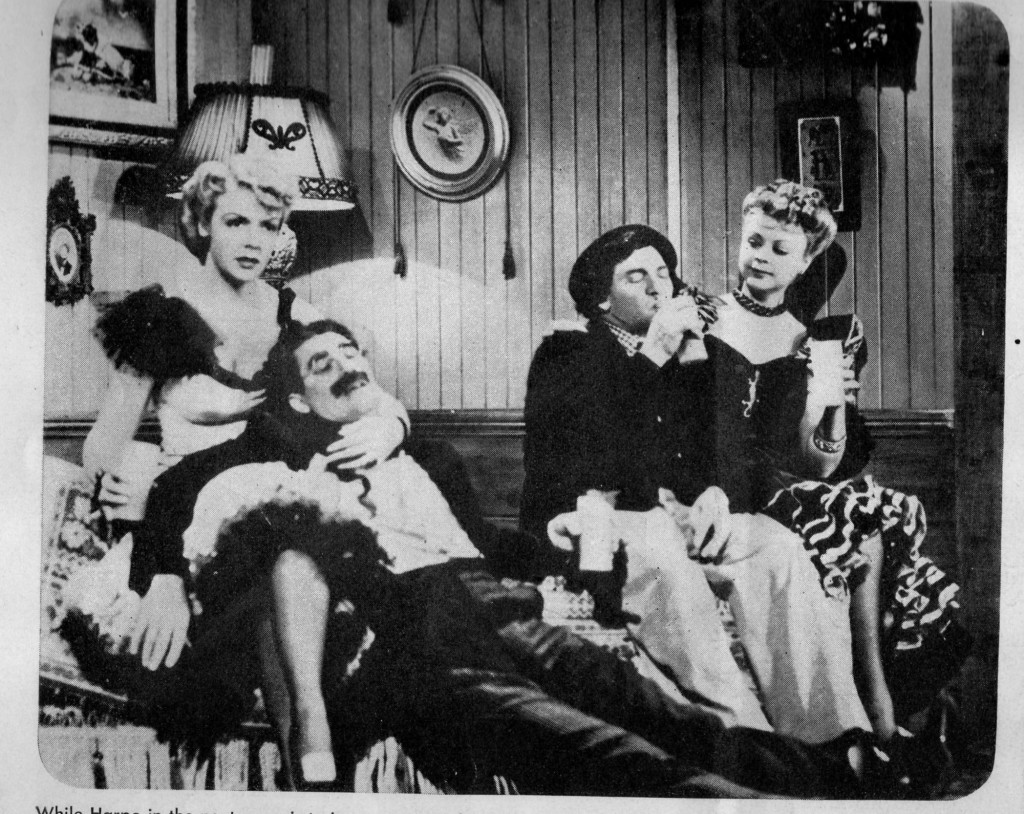
BEST PART OF THE NIGHT
About halfway in I realize: this is not nostalgia, these are pop historians. Jordan Young describes his work as, “the diggings of a cultural archeologist.” Afterwards, I ask his wife if she thought the panel had covered the basics pretty well — the legal aspects, dealing with a subject’s family members, getting their memories straight. Yes, she says, “but it did skirt into the weeds a bit.” I think back on one panelist who described “looking for stills from Nancy Drew movies,” and another bringing up clearances and contracts. Still another mentioned Emil Jannings (1884-1950) in regards to a bon mot from Ernst Lubitsch (1892-1947). I wanted to blurt, “Where’s my MTV?” into the microphone I was forced to share with Robert S. Bader, but that would have sounded ancient…
Inside baseball to be sure, but this was about nostalgia.
SEMI PROFESSIONAL PANELIST LOOKING FOR TWO-HOUR POSITION
I could have been a better panelist. When moderator Birchard, author of King Cowboy: Tom Mix and the Movies, said he recalled Shakespeare’s “Richard III” appearing on TV’s “Omnibus” in the 1950s, I asked why, with today’s plethora of stations we still have no Shakespeare channel. “Springsteen claimed in song how there were ’57 Channels and nothing’s on. But today there’s like a zillion aren’t there? Thornton Wilder said at the end of every civilization there’s a period of great creativity and production. Look at the stuff being churned out, the platforms, the programming!”
Oh well. Just trying to get the conversation beyond clearances and contracts. At the panel’s completion, some of us rush off to greet well-wishers or potential customers, some remain seated there at the dais, basking all self-actualized, awaiting groupies. A woman comes up to tell me the story of a young actor in the closet who marries a woman, Hollywood style, but she kills herself, and a year later with the same gun, he kills himself.
“Great Story, huh?”
Um, I did make two nice contacts. One said she had a friend in Madrid who could translate the Italian version of The Wicked Wit — A PESCA CON GROUCHO — into Spanish. Then I’ll translate from Spanish back into English to see if any jokes exist at all.
As well as the IWOSC panel went, the Los Angeles Times Festival of Books has never booked me to appear, despite my applying for “Memoir,” “Hollywood Biography” “Senior Memoir” and “Humor” panels, and despite having written for the paper for ten years including two stories about Irv Brecher, THE wicked wit of the west, given that moniker by Groucho himself.
Perhaps I’m bitter about never making it onto their rarified USC and UCLA stages in late April every year since 1995? (See picture of typical panel above) Listen, I spend a lot of time alone writing, so when I do make public appearances — slide shows about Irv Brecher pretty much — I tend to get excited.
But hey, IWOSC wanted me on their panel, right?
Perhaps I could learn how to become a professional panelist. Should I try and become more nostalgic? Anyway, if you know of any upcoming panels, I might be able to add some semi-comic relief to the proceedings.
(I mean, the guy’s own wife thought he got into the weeds; this is from someone who gets all his arcane references, you know?)
Finally, one more IWOSC audience member came up. She’d seen me reading TWWOTW at Chevalier’s Books on Larchmont in Los Angeles a few years ago. “Remember when you gave me the Groucho glasses and nose?” she asked. I didn’t, but I told her I should have given her a kiss instead, and leaning past the microphone stand, pushed into her as she stood on her tippy toes to reach the dais and I thought: That’s showin’ em! If a semi-professional panelist can’t get a kiss, he aint doin his job right.
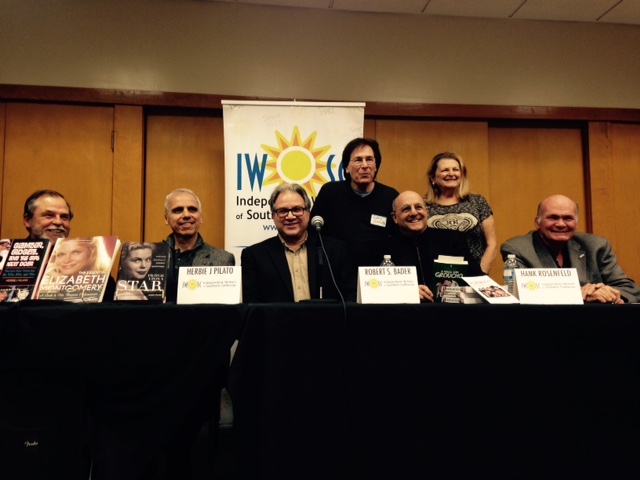
Nostalgia Writing/When the Past Sings Make it Zing!
Jordan R. Young, Herbie J Pilato, Robert S. Bader, Gary Young, HR, Flo Selfman, Bob Birchard
WEBSITES REFERRED TO
Independent Writers of Southern California
http://iwosc.org/calendar/index.html#monthly_meeting
Jordan R. Young
http://www.thecommentarytrack.com
Herbie J Pilato
http://classictvps.blogspot.com
Chevalier’s Books
chevaliersbooks.com
A Pesca Con Groucho!http://www.libridivertenti.it/a-pesca-con-groucho-c2x13427728
Conversation Starter?
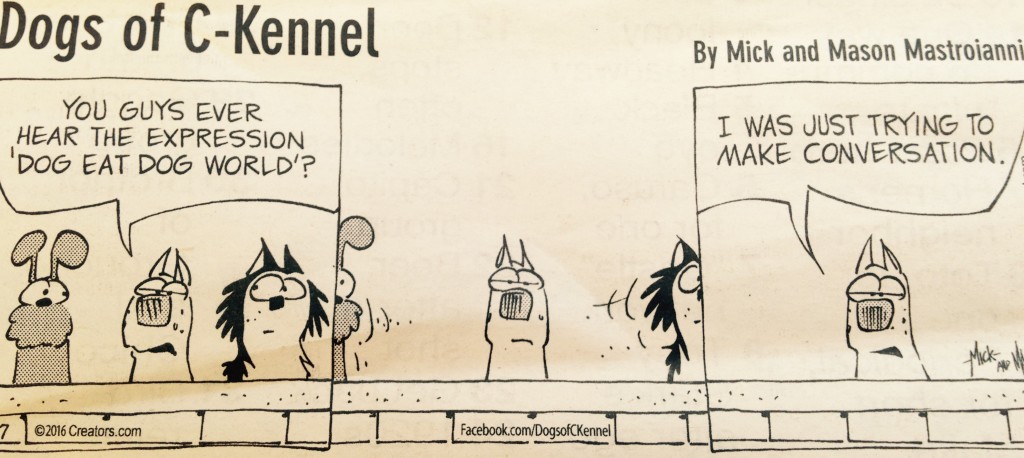
Have you ever been NOSTALGIC for good conversation? Not just with friends, but with anybody?
That’s next time, coming to this blog near you ASAP!
Bonus
Humor is “that insuperable friendship coagulant,” writes Catherine Blythe on page 218 of her helpful book, The Art of Conversation.
http://www.amazon.com/The-Art-Conversation-Neglected-Pleasure/dp/1592404979
TALKED TO DEATH
Some of our most difficult conversations have to do with death.
Don’t they?
Having lost three people close to me in the last months, I’ve been to too many funerals to know what to say anymore.
Actually, after so much practice, I SHOULD know what to say, right?
But I just hug.
I know that doesn’t exactly help promote conversation. (Well, maybe it does, after an embrace?)
I prefer the silence of a heartfelt hug if the alternative is old platitudes that serve only to fill up time and space: “He’s in a better place” and “It was his time.”
Awkward!
So hug until the person lets you go. Let them let go first.
“Sorry for your loss.”
“My condolences.”
For other ways to converse when dealing with death, check out this “AT A LOSS” entry:
On a lighter note, here’s what philosopher Ralph Waldo Emerson said about it in 1888: “We are afraid of truth, afraid of fortune, afraid of death and afraid of each other.”
Yoiks!
A real conversation-stopper there, Ralphie boy.
“Hello? What? Ralph Waldo wants to come over for a little chit-chat? Um, no thanks, I’m late for my Transcendentalism class!”
Bonus
Good news: Tom Wolfe has a new book out about how we talk to each other, called “The Kingdom of Speech.”
“Tom Wolfe traces the often-amusing history of bickering over how humans started talking”
Finally, Beware Bringing About the Death of Conversation Itself
Those dry sticky salivaless sounds which can be death to a good conversation.
David Foster Wallace, author of INFINITE JEST, celebrating its 20-year anniversary
B F G ! Big Friendly Giant is Big Funny Talker
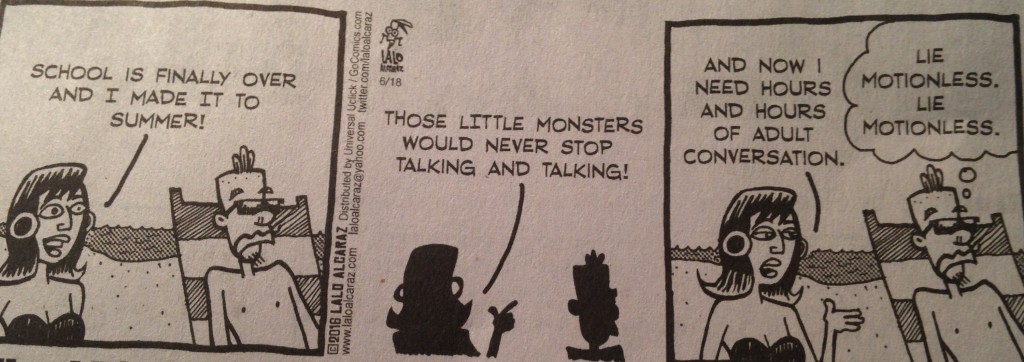
I recently saw a summer movie I loved, mostly for its language. And that language was English. “THE B F G” is a Disney movie for all ages which I recommend you see. British actor Mark Rylance plays the lead, a “Big Friendly Giant” (BFG) and his character is constantly playing with the English language in a fractured, goofy way. Seeing the film sent me to its source, the book written by Roald Dahl. As author, Dahl invented the words the B F G comes up with. Here’s a section where the B F G, after offering her something called a snozzcumber for lunch, explains to his new friend Sophie why he uses funny words:
‘Do we really have to eat it?’ Sophie said.
‘You do unless you is wanting to become so thin you will be disappearing into a thick ear.’
‘Into thin air,’ Sophie said. ‘A thick ear is something quite different.’
Once again that sad winsome look came into the B F G’s eyes. ‘Words,’ he said, ‘is oh such a twitch-tickling problem to me all my life. So you must simply try to be patient and stop squibbling. As I am telling you before, I know exactly what words I am wanting to say, but somehow or other they is always getting squiff-squiddled around.’
‘That happens to everyone,’ Sophie said.
‘Not like it happens to me,’ the B F G said. ‘I is speaking the most terrible wigglish.’
‘I think you speak beautifully,’ Sophie said.
‘You do?” cried the B F G, suddenly brightening. ‘You really do?’
‘Simply beautifully,’ Sophie repeated.
‘Well, that is the nicest present anybody is ever giving me in my whole life!’ cried the B F G. ‘Are you sure you is not twiddling my leg?’
‘Of course not,” Sophie said. ‘I just love the way you talk.’
‘How wondercrump!’ cried the B F G, still beaming. ‘How whoopsey-splunkers! How absolutely squiffling! I is all of a stutter.’
Using Funny Words
BFG makes a conversation fun, doesn’t he? Throwing in a twisted word is like a quick little tickle to his friend Sophie and she finds it beautiful. To the reader, it comes off like a surprise slap to the brain’s funny bone. You look at the word longer while trying to decipher its meaning.
When you add something wondercrumpish like the B F G does to his sentences, you are being more playful with the language. Children do this all the time, inventing words by mistake. (This is part of the appeal of author Roald Dahl who makes it fun for young readers with his funny characters.)
When you try it in conversation, it can be a witty wake-up call telling your companions, “Here’s something different. Listen to THIS!”
Tips
Next time you’re out a a restaurant, order the “ankle steak.” Whaaa? Sounds like something from a very different part of the cow don’t it? Or how about trying the “Macabre Salad” instead of a Cobb Salad? Watch children squirm with delight. Does that mean you want a dark and scary salad? Not really, it’s a learning moment, to teach the meaning of the word macabre.
When you play with words while conversing, you get into the moment. When you toss in a goofy word, you change the moment. The listener has to stop and think about the sentence. Maybe ask a question about the word. Soon the teaching work blends together with play beautifully. (Ah, such a secret engagement!)
Making such a play in your conversation makes room enough so that ensuing conversation can become as big as your subject, big as your imagination. When you invent and explore this way, you will find interesting people interested in playing with you, too. I guarantee ya!
Quick example: the original title for this blog was “PLEASED TO MEET ME.” It is not only the title of a Replacements rock-and-roll record * — but it twists (a BFG squiff-squiggle?) around the words you would normally expect, which are: “Pleased to meet you.” Whatever does that mean? “Pleased to meet me.” I see it as a folk journalist’s attempt to engage with a subject on such a new, enlightening, or surprising level, they were glad you happened to come along!
I once began a radio report, about L.A. high schoolers being forced by the “No Child Left Behind” law to sign up for the draft, this way: “In our local high schools, the student opt-out rate is soaring.” Here I was playing on, “drop out rate.” Journalists do this all the time, trying to “capture the ear” and make the listener listen more closely to the sentence.
So just as playing with other people back-and-forth brings a folk journalist his greatest pleasure, you too can turn into a merry mythemagician the next time you find yourself cruising the old conversation station for a cuppa chit chat. Add to the mix that extra brew ‘yo, you’ll find your references soon a-flying like postmodern posts, leaving you and your partner laughing it off and changing your world one conversation at a time!
Bonus
Check out these Word Smithies:
“Words are the world we live in. Locution Locution Locution.” Wittgenstein
Groucho Marx once said, about to go up as the elevator door closed, “Men’s tonsils, please.” **
Modern Hebrew is like Elizabethan English. Its a marvelous instrument. I’ve even been able to invent new words where none existed before by joining certain words. Amos Oz
The Firesign Theatre, perhaps the greatest American comedy group, has nothing but fun with the English language: “It’s hotter than a heater in hell’s mouth in King’s Nose, Pennsylvania.” For even funnier and more accurately quoted big funny goodies from them, checkout: www.firesigntheatre.com/
And speaking of funny conversationalists, enjoy the master (referenced above in an elevator):
Other References
* The Replacements record album http://www.allmusic.com/album/pleased-to-meet-me-mw0000195442
** From the book BRIEF ENCOUNTERS by Dick Cavett, Henry Holt 2014 http://www.nytimes.com/2014/12/21/books/review/dick-cavett-by-the-book.html?_r=0
And one more from THE BFG by Roald Dahl
‘What happens when a giant dies?’ Sophie asked.
‘Giants is never dying,’ the B F G answered. ‘Sometimes and quite suddenly, a giant is disappearing and nobody is ever knowing where he goes to. But mostly us giants is simply going on and on like whiffsy time-twiddlers.’
